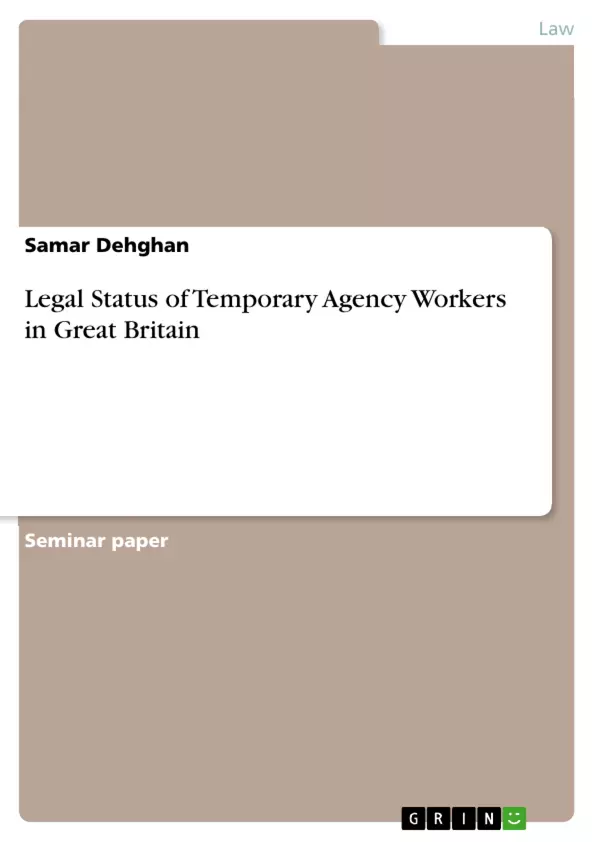The relatively recent case of James v London Borough of Greenwich, [2008] IRLR 302 has shaped English employment law surrounding the legal status of temporary agency workers. In recent years, there has been a shift in the attitudes surrounding the employment status of agency workers by the both the judiciary and Parliament.
This paper is aimed at critically assessing the implications of James in order to determine whether the current position benefits both the private recruitment industry and individuals who value flexibility in their working arrangements. This will be outlined only after a brief, but concise, summary of the legal position prior to the decision in James.
Inhaltsverzeichnis (Table of Contents)
- INTRODUCTION
- THE POSITION BEFORE JAMES
- JAMES V LONDON BOROUGH OF GREENWICH
- POST JAMES
- Shift in Principle
- Policy Issues
- CONCLUSION
Zielsetzung und Themenschwerpunkte (Objectives and Key Themes)
This paper critically assesses the implications of the James v London Borough of Greenwich case in English employment law regarding the legal status of temporary agency workers. It investigates whether the current legal position benefits both the private recruitment industry and individuals seeking flexible work arrangements. The paper does this by examining the legal position before the James decision and analyzing the impact of the case on the legal status of agency workers.
- The legal status of temporary agency workers in the UK
- The impact of the James v London Borough of Greenwich case on the legal status of agency workers
- The policy implications of the James decision for both the recruitment industry and agency workers
- The role of legislation in regulating the employment status of agency workers
- The challenges and opportunities presented by the current legal framework for agency workers
Zusammenfassung der Kapitel (Chapter Summaries)
- INTRODUCTION: Introduces the topic of the legal status of temporary agency workers in the UK, focusing on the significance of the James v London Borough of Greenwich case. The paper aims to critically assess the implications of this case for both the recruitment industry and agency workers.
- THE POSITION BEFORE JAMES: Provides a brief overview of the legal landscape regarding agency workers before the James decision. This section highlights the challenges faced by agency workers in establishing employee status and explores the historical judicial approaches to determining their legal position.
- JAMES V LONDON BOROUGH OF GREENWICH: Details the James case, focusing on the Court of Appeal's decision and its implications for the legal status of agency workers. The section examines the key arguments presented by the parties and analyzes the reasoning behind the court's judgment.
- POST JAMES: Examines the impact of the James decision on the legal status of agency workers. It analyzes the shift in principle and policy implications of the decision, discussing the challenges faced by agency workers in establishing an employment relationship with either the agency or the client.
Schlüsselwörter (Keywords)
This paper examines the legal status of temporary agency workers in Great Britain, with a particular focus on the landmark case of James v London Borough of Greenwich. The paper explores key themes such as employment law, agency work, legal status, employment contracts, control, mutuality, and the role of legislation in regulating atypical work.
Frequently Asked Questions
What is the significance of the James v London Borough of Greenwich case?
This landmark 2008 case significantly shaped English employment law regarding the legal status and employment rights of temporary agency workers.
Can agency workers easily establish "employee" status in the UK?
Establishing employee status is challenging due to the legal requirements of "control" and "mutuality of obligation," which are often absent in triangular agency relationships.
How did the legal position change post-James?
The case led to a shift in principle, making it harder to imply a contract of service between the worker and the end-user client unless it is necessary for the relationship to make sense.
Does the current law benefit workers who value flexibility?
The paper assesses whether the current framework balances the flexibility desired by some individuals with the need for legal protection and industry stability.
What was the judicial approach before the James decision?
Prior to James, there was ongoing uncertainty and varying judicial approaches to determining whether agency workers were employees of the agency, the client, or neither.
- Citation du texte
- Samar Dehghan (Auteur), 2011, Legal Status of Temporary Agency Workers in Great Britain, Munich, GRIN Verlag, https://www.grin.com/document/371879



